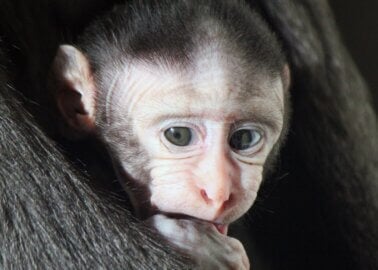Congolese Space Firm Publicly Supports Animal-Free Research
Update (26 July 2022):
KEKA Aerospace – a private space agency in the Democratic Republic of the Congo – has publicly confirmed in a tweet chain that a rat named Kavira died last year “because of a failure” aboard the firm’s Troposphere 5 rocket and that the company “will never use animals in [its] research again”, including for its planned Troposphere 6 rocket launch later this year.
The company’s new public policy follows an e-mail from Jean-Patrice Keka – the founder of the Congolese parent company Développement Tous Azimuts (DTA), who has been dubbed the “African Einstein” by the media – to PETA US in 2021 announcing “a total ban on the use of animals in DTA’s space experiments” and the sparing of a guinea pig named Galaxionaut, for which PETA US awarded Keka its Lifesaver Award (details below).
KEKA Aerospace’s bold, public commitment to scrapping all experiments on animals is a decisive win for humane space flight. It puts the Swiss-backed firm from the Democratic Republic of the Congo on the map as a compassionate innovator in this field.
We are relieved and happy that no more terrified animals will be locked into capsules, shot high into the sky, and killed in crash landings for any future launches of the Congolese company’s Troposphere rockets. Animals aren’t astronauts, and we congratulate Keka for being light-years ahead in the human-only space race.
Updates (10 August 2021):
It’s a big win for animals! After receiving a letter from PETA entities, Jean-Patrice Keka Ohemba Okese, Congolese founder of space company Développement Tous Azimuts (DTA), has replied in writing that he will immediately free the guinea pig named Galaxionaut and not launch him aboard the rocket Troposphere 6, as previously planned.
Keka has also announced “a total ban on the use of animals in DTA’s space experiments” and said that the capsule of his Troposphere 6 rocket “will be fitted with various sensors, which is an alternative method to achieve the same result without the use of animals”.
This is an important step in the fight for animal rights – not only in the Democratic Republic of the Congo and in space research, but everywhere in the world. PETA US now intends to honour Keka’s compassionate and progressive decision by giving him a PETA Lifesaver Award.
Scientists Urge Congolese Space Company to Stop Launching Animals Into Space
5 August 2021
The space race is back on in 2021, but launching animals into orbit is a cruel practice that must remain in the past. PETA US has written to the Congolese enterprise Développement Tous Azimuts (DTA) urging it to join the human space race by prohibiting the use of animals in experiments. The company will reportedly attempt to launch its rocket, Trophosphère VI, 120 miles into space with a guinea pig named Galaxionaut on board.
 Image: KEKA Aerospace / Facebook
Image: KEKA Aerospace / Facebook
Our Fellow Animals Aren’t Disposable Objects to Use for Research
PETA US is asking DTA to transfer Galaxionaut to an approved animal sanctuary to live in peace instead of forcing the living, feeling being to endure a terrifying space flight.
Guinea pigs are social animals who communicate with each other by licking, squeaking, and chirping. They’re also prey animals, so they burrow and hide when threatened. Undoubtedly, trapping Galaxionaut alone in a rocket and launching him into space will be an extremely traumatic – if not deadly – experience.
The company already lost an animal – a rat named Kavira – in a previous launch of Trophosphère V. That rocket smashed into a rock. Kavira was never found and is presumed dead. This should never have happened in the first place – and it shouldn’t happen again.
Get With the (Ethical) Programme!
PETA US has already persuaded NASA not to support or conduct horrific space experiments using monkeys, and the European Space Agency also rejects monkey experiments for these purposes.
Using animals for research is cruel, useless, and a waste of valuable resources. You can help steer science towards humane, human-relevant research methods by supporting PETA’s Research Modernisation Deal.



